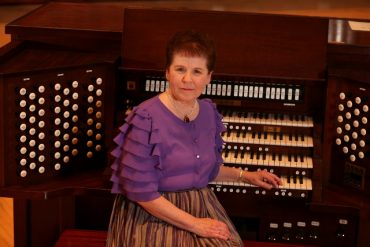Along with Funeral Directors, organists go to rather more funerals than other people. It’s the job. Professionally, funerals tend to be better paid than ordinary services, but by their very nature they are unpredictable and come at short notice, so the potential for making a hash of it is proportionally higher. No-one wants to be remembered as that dreadful organist who ruined Uncle Patrick’s funeral, so here’s my essential guide for anyone who hasn’t gone through this particular experience before.
Folk often arrive early for funerals. The church can start filling up a good 45 minutes before you are due to start playing, so give yourself plenty of leeway for that last minute practice, if you need it.
Look at the printed Order of Service. REALLY look at it. In spite of what the Vicar may have told you a week ago (just three hymns, and Nimrod at the end) there is a very strong possibility that this will have changed, and no-one will have thought to tell you. So now Nimrod is at the beginning, there are five hymns, with two tune options for hymn four and you don’t have the music to hymn five. Always carry a few backup hymn books with you, in case the tune you urgently need isn’t in the standard hymn book at the church.
The Order of Service may only arrive seconds before the coffin, but you MUST see it before the service starts. Prime a churchwarden, undertaker, anyone, to get one to the organ bench without fail. Even if the music itself hasn’t changed since you were briefed, you can almost guarantee the printed hymn verses will not be the same number/in the same order as those in the hymn book you are playing from.
People who are attending a church funeral may well not be regular church-goers. Be prepared for nothing more than a vague mumbling coming back to you from the congregation as you launch into the first hymn. This is a very spooky feeling, but keep calm and carry on – many’s the time the presiding Minister and I have powered through The Day Thou Gavest Lord is Ended as pretty much a solo act.
Get the Minister to give an executive decision in advance on which tune to use for hymns which come with several options. (The Lord’s My Shepherd being a common disaster area – CRIMOND or BROTHER JAMES’ AIR? All Things Bright and Beautiful has three tunes, just to add to the merriment.) Otherwise you will have to make that decision on the day, in the certain knowledge of upsetting the family if you play the ‘wrong’ one.
Get organised. Build up a folder of suitably decorous music to play quietly as people come in. You are doing a good thing here – no-one really wants to be at a funeral, and it helps settle people down and cover the awkward silences. No need to be particularly original or clever – the old favourites are absolutely fine. One of those anthologies of Fifty Essential Melodies for the Funeral Organist is a good investment. If in doubt, play Bach.
Refuse to play anything really ridiculous on the organ, unless you genuinely feel up to it and confident. I know we should be promoting live music, but you want to keep your reputation. If the deceased wants to leave the church to a Heavy Metal Anthem or The Birdie Song, or similar that you honestly would be very lucky to pull off convincingly on the organ, ask that the family provide the track in some form or other. Refuse to have anything to do with actually playing the track, though, however much someone is faffing incompetently around with the sound system behind you. You don’t need that particular hassle.
You are there to do a professional job. Don’t worry about getting upset – you usually won’t unless you are playing for the funeral of a close friend or family member in which case good luck. (Though if you do stumble while playing at your own Granny’s funeral, no-one will be at all surprised or offended – quite the opposite.)
Listen to the eulogies. The deceased may have chosen unremarkable music for you to play, and lived a very ordinary life, but everyone’s story is worthy, for these brief minutes, of our attention.
Some wise advice to a newbie funeral organist from Matt Edwards @MJE_Organist on Twitter: ‘Do not identify with the coffin. We all develop coping mechanisms for the hardest of services. Play your very best but don’t seek recognition. There will still be ones that get to you – and they should.’
Everyone will sweep off at the end – to the graveyard, to the wake – and you will be left playing the final bars of your going-out music feeling a bit of a spare part. All we then can do is pack up our music and shoes, switch off the organ and go back out into the world – giving thanks that we CAN go back out into the world after this reminder of human mortality, and that we contributed the gift of music to the occasion.





One of the privileges is the insight you get and the photos you see of the deceased as a younger person when you have only know them in the twilight of their lives.
Yes – it’s good to see those pictures of people when they were full of the glamour of youth.
Excellent advice. My only addition, particularly for people like me who are sometimes called to play on organs they have never seen before, is that your folder of “suitable music” needs to include things that are playable on literally any instrument, no matter how dire; things that will work on one manual with simple pedals or no pedals at all, and minimal registration changes. They don’t need to be complicated. The Bach WTC1 C major prelude always sounds good, as does Davies’ “Farewell to Stromness.”
I was just thinking about Farewell to Stromness the other day, and also decided it should go in my folder of funeral music. Thanks Patti.
In Germany and Switzerland, the fee for funerals is not greater than that for Sunday, indeed in Germany it is about 20% less. However there is less playing to do – a bell rings until the hour of the service, and only then does one start to play, often to accompany the minister’s entrance. For this the first movement of Stanley’s Voluntary in F major (Op. 7/IV) or Smart’s Air (from his Air & Variations in A major) are ideal, as they flourish for a few seconds before coming humbly down to earth at the close.
Apart from hymns (if any) the German funeral organist usually has no music to play during the service itself, but often has to compete at the end with the same bell, so the choice here is to play something quiet which nobody will hear as they get within bell-shot, or play something loud and cause a cacophony. Fortunately Abide with me – which is also sung in Germany – is in the same key as the bell at our local cemetery. (I have already taken the point up with my minister – who sees nothing wrong with a cacophony to end up with…)
Fr my cousin-in-law’s funeral I was asked for Mull of Kintyre as a recessional, and found it very effective, with its overtones of a mystic lament.
Thank you Douglas! – I’ve never had to compete with a bell, though the bell-ringers giving it their all when we are trying to hold a pre-service choir practice can be fairly trying. Morwenna
Correction – the Stanley is Op.7/VI). Sorry!
Another hazard encountered today: a modern hymn (Make me a channel of thy peace) with an irregular refrain. As (wrongly) printed in the order of service, we all ended up at the end with a surplus refrain on the dominant. A calm organ cadence back to the tonic wasn’t difficult to add, but I’m glad I spotted it early!
Definitely listen to the eulogy, particularly if the outgoing music is “Organist’s own choice”. The family of the deceased opera lover will appreciate a Lascia ch’io pianga. (Another useful piece to have handy.) As to getting too emotionally involved, it can be hard not to , but I always imagine that when I put on the cassock & surplice, it is like an actor putting on the greasepaint & becoming a character.
Another classic this week: All Things Bright and Beautiful was printed in the Order of Service WITHOUT the customary opening refrain – so to avoid an embarrassing musical muddle between folk who knew how it should start, and folk who didn’t, I had to ask the Minister to announce that we would start the hymn with the refrain, as usual. Was told later it was omitted to save space so they could put something else on the page.
Another piece of advice – check the time of the funeral the day before. Unlike weddings, which are fixed months in advance, funerals are arranged at short notice and problems with timings can arise. I had a situation where after I was booked, the Crem had to change their time and so the funeral part at church was made 30 mins earlier. This was before the Order of Service went to print so all was well, but they forgot to tell me. I arrived an hour before with (I thought) plenty of time. But in fact I then only had 30 minutes and people had already arrived and were sitting waiting. Always check!
The Lord’s my Shepherd’s curse striketh again…
“It’s Crimond isn’t it?”
“Yes, definitely Crimond”
“Not Brother James?”
“Nope.”
Time passes…
Order of service arrives with ten minutes to go (luxury)
“and I will truusst in yooou aloooone”
I’ll get my coat, the one with the copy of the Townend in the pocket.
Aaagh.
I was playing for a friend’s Memorial Service last week. He had asked me 5 years earlier, and had told me that one of the hymns he wanted was “O come, O come, Emmanuel”. I love it, so was very happy, even though Advent at midsummer is unusual. His widow and I had sorted out the rest of the music, to suit the very dilapidated organ in their church. I had played through a couple of times and was reasonably confident. I had not reckoned on the fact that he was a very popular man and the church was full. Three women, less than a foot behind me, did not stop talking at any time. Their heads completely blocked my mirror, and they moved them all the time. I asked them to stop, explained that it’s horribly disconcerting and they stared, went quieter for about a minute, then started up again. They couldn’t sit, as there were no chairs left, so one of them sat on my carefully-arranged music on the chest by the organ. As a result, I was up tight for the whole of the service, wondering what they would do next, and have played better. Does anyone have any ideas about what to do under those circumstances? Murder springs to mind, but it would take time….
Relatable as most Sunday mornings and Wednesday eve choir rehearsals, when Director or Coordinator pauses by the organ bench (as I am seated, ready to begin playing) to relate some important bit of upcoming info, always one or more sopranos who must socialize at the same corner and bit of time for attention, arghhh.